BP has asked United States regulators for permission to resume drilling in the Gulf of Mexico, the New York Times said on April 3.
The request comes less than a year after the devastating oil spill in the gulf, caused by an explosion in BP’s Deepwater Horizon rig in which 11 workers died.
The NYT said: “BP is seeking permission to continue drilling at 10 existing deepwater production and development wells in the region in July in exchange for adhering to stricter safety and supervisory rules, said one of the officials.
-
-
 “As Palestinians were preparing for their weekend this Thursday afternoon,” ElectronicIntifada.net said on April 7, “all of a sudden barrages of Israeli artillery fire and air raids by warplanes struck several regions of the Gaza Strip”. “Five Palestinians were killed and about thirty more injured. Israeli shells struck farm land, homes, a mosque and an ambulance.” Israel has threatened to escalate its military assault on the Gaza Strip. ElectronicIntifada.net said on April 4 that more than 20 Palestinians had been killed by Israeli attacks since the start of March.
“As Palestinians were preparing for their weekend this Thursday afternoon,” ElectronicIntifada.net said on April 7, “all of a sudden barrages of Israeli artillery fire and air raids by warplanes struck several regions of the Gaza Strip”. “Five Palestinians were killed and about thirty more injured. Israeli shells struck farm land, homes, a mosque and an ambulance.” Israel has threatened to escalate its military assault on the Gaza Strip. ElectronicIntifada.net said on April 4 that more than 20 Palestinians had been killed by Israeli attacks since the start of March. -
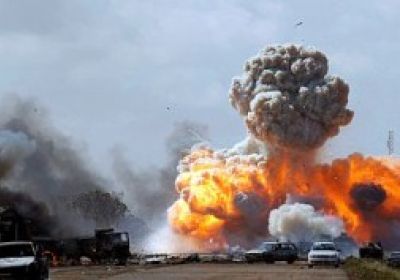 We now know what Washington’s model is for the Middle East, in its most attractive guise. In answer to Egypt’s Tahrir Square uprising, they have smoking craters filled with the charred remains of rebels, conscript soldiers, civilians and other blameless people who must have seen the joy in Egypt and Tunisia and wished it for themselves. In answer to the turbulent, democratic republic, with its tumult of leftist, Nasserist, Islamist and liberal currents, they offer a prolonged civil war at best, culminating in a settlement with Muammar Gaddafi’s son Saif and his sibling.
We now know what Washington’s model is for the Middle East, in its most attractive guise. In answer to Egypt’s Tahrir Square uprising, they have smoking craters filled with the charred remains of rebels, conscript soldiers, civilians and other blameless people who must have seen the joy in Egypt and Tunisia and wished it for themselves. In answer to the turbulent, democratic republic, with its tumult of leftist, Nasserist, Islamist and liberal currents, they offer a prolonged civil war at best, culminating in a settlement with Muammar Gaddafi’s son Saif and his sibling. -
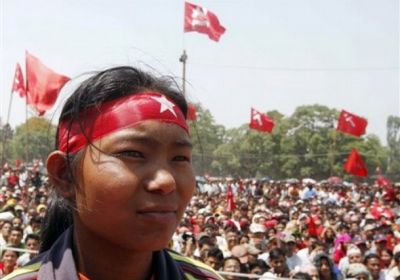 Secret US diplomatic cables released by WikiLeaks on March 15 show that former US ambassador to Nepal, James Moriarty, actively sought to destabilise Nepal’s peace process in order to prevent a Maoist rise to power. The Maoist-led People’s Liberation Army waged a decade-long “people’s war” against Nepal’s centuries-old feudal monarchy. A people’s uprising in 2006 brought the monarchy down, opening the way for an elected constituent assembly in 2008.
Secret US diplomatic cables released by WikiLeaks on March 15 show that former US ambassador to Nepal, James Moriarty, actively sought to destabilise Nepal’s peace process in order to prevent a Maoist rise to power. The Maoist-led People’s Liberation Army waged a decade-long “people’s war” against Nepal’s centuries-old feudal monarchy. A people’s uprising in 2006 brought the monarchy down, opening the way for an elected constituent assembly in 2008. -
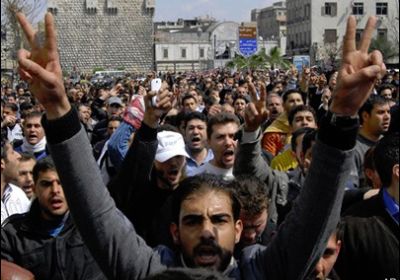 A popular rebellion is shaking the regime of Syrian ruler Bashar al-Assad — and highlighting the hypocrisy of US policy in the region. The protests of recent weeks spread further following Friday prayers on March 25. The Syrian regime responded with vicious repression that left at least 61 people dead, and with a belated promise of reform.
A popular rebellion is shaking the regime of Syrian ruler Bashar al-Assad — and highlighting the hypocrisy of US policy in the region. The protests of recent weeks spread further following Friday prayers on March 25. The Syrian regime responded with vicious repression that left at least 61 people dead, and with a belated promise of reform. -
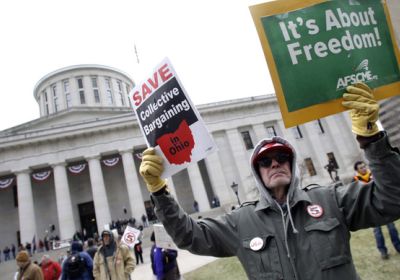 The bad news for Ohio’s 350,000 public workers is that a new law bans them from striking — the good news is at least they will no longer risk jail for doing so. A March 30 Reuters article said: “Ohio’s legislature on Wednesday passed a Republican measure to curb the collective bargaining rights of about 350,000 state employees, and Governor John Kasich said he will sign it into law.” The new law will ban unions from striking in support of public workers and limit workers’ ability to collectively bargain.
The bad news for Ohio’s 350,000 public workers is that a new law bans them from striking — the good news is at least they will no longer risk jail for doing so. A March 30 Reuters article said: “Ohio’s legislature on Wednesday passed a Republican measure to curb the collective bargaining rights of about 350,000 state employees, and Governor John Kasich said he will sign it into law.” The new law will ban unions from striking in support of public workers and limit workers’ ability to collectively bargain. -
US coal giant Drummond paid right-wing paramilitaries accused of murder and human rights abuses for protection of its Colombian operations, Colombiareports.com said on March 16. The article said the information was revealed in secret diplomatic cables sent between 2006-2010 released by WikiLeaks to the Colombian paper El Espectador,
-
 The US-NATO intervention in Libya, with United Nations Security Council cover, is part of an orchestrated response to show support for the movement against one dictator in particular. In doing so, it aims to bring the Arab rebellions to an end by asserting Western control, confiscating their impetus and spontaneity and trying to restore the status quo. It is absurd to think that the reasons for bombing Tripoli or for the French airforce’s “turkey shoot” (the bombing of fleeing Libyan soldiers) outside Benghazi are designed to protect civilians.
The US-NATO intervention in Libya, with United Nations Security Council cover, is part of an orchestrated response to show support for the movement against one dictator in particular. In doing so, it aims to bring the Arab rebellions to an end by asserting Western control, confiscating their impetus and spontaneity and trying to restore the status quo. It is absurd to think that the reasons for bombing Tripoli or for the French airforce’s “turkey shoot” (the bombing of fleeing Libyan soldiers) outside Benghazi are designed to protect civilians. -
Israeli forces have sealed the occupied West Bank village of Beit Ommar since March 24 for an indefinite time. Soldiers continue to arrest young Palestinian residents and hold them in Israeli detention centres. In a move akin to the four-year-long economic blockade against the Gaza Strip, Israeli soldiers have closed the six entrances to the village of 17,000 inhabitants. It has imposed a widespread prohibition policy against all major imports and exports from the village. This includes gasoline, produce, raw industrial materials and basic supplies.
-
Economists warned on March 31 that the British government’s public-sector cuts will leave a shortfall of more than half a million jobs. The New Economics Foundation (NEF) also warned that nowhere in the budget or “plan for growth“ was there “any evidence that the business tax cuts, regulatory tweaks and relatively minor changes to public-sector investment that are promised will deliver major economic transformation”. Trade Union Congress general secretary Brendan Barber said the findings showed that “in recent years, the market has become the master, not the servant, of society”.
-
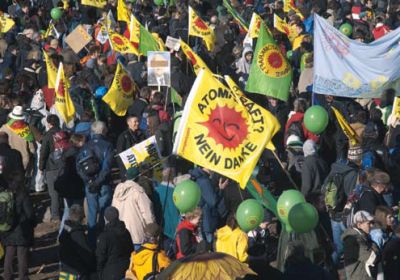 The largest anti-nuclear protests in German history were held on March 26. About 250,000 people marched in Germany’s four largest cities. Under the slogan “Fukushima Warns: Pull the Plug on all Nuclear Power Plants”, more than 120,000 took to the streets of Berlin, 50,000 in Hamburg, 40,000 in Koeln and upward of 40,000 marched in Muenchen. In state elections held the next day, the German Greens won a historic victory in Baden-Wuerttemberg. They will form Germany’s first-ever Green-led government. They also tripled their vote in elections in Rheinland-Pfalz.
The largest anti-nuclear protests in German history were held on March 26. About 250,000 people marched in Germany’s four largest cities. Under the slogan “Fukushima Warns: Pull the Plug on all Nuclear Power Plants”, more than 120,000 took to the streets of Berlin, 50,000 in Hamburg, 40,000 in Koeln and upward of 40,000 marched in Muenchen. In state elections held the next day, the German Greens won a historic victory in Baden-Wuerttemberg. They will form Germany’s first-ever Green-led government. They also tripled their vote in elections in Rheinland-Pfalz. -
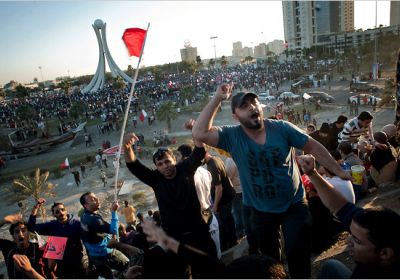 The pro-democracy movement in Bahrain has been severely weakened by the brutal wave of repression that began on March 15. Attempts to reignite pro-democracy protests have been broken up by government security forces and strikes have been called off. Troops from Saudi Arabia and the United Arab Emirates entered Bahrain on March 14 to help the Bahraini government “restore order” by attacking thousands of pro-democracy protesters.
The pro-democracy movement in Bahrain has been severely weakened by the brutal wave of repression that began on March 15. Attempts to reignite pro-democracy protests have been broken up by government security forces and strikes have been called off. Troops from Saudi Arabia and the United Arab Emirates entered Bahrain on March 14 to help the Bahraini government “restore order” by attacking thousands of pro-democracy protesters.